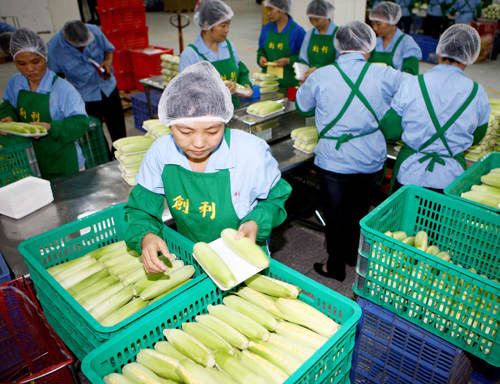|
 |
|
SAFE VEGETABLES: To ensure Hong Kong residents eat safe vegetables, the Inspection and Quarantine Bureau in Shenzhen adopts strict supervisory and monitoring measures (XINHUA) |
In 2009, the non-profit campaign for safe cosmetics urged consumer product giant Johnson & Johnson to remove cancer-causing chemicals dioxane and quaternium-15, that releases formaldehyde from one of its baby shampoo products. Although the company promised to gradually phase out the chemicals, the organization's latest research reveals that quaternium-15 is still an ingredient in the company's baby shampoo sold in countries including China. However, quaternium-15 is not in the same product sold in some other countries.
The company responded by claiming that all of its products sold worldwide have met local regulatory safety standards. We have reasons to be angry about the "double standards" of product safety adopted by the company, but we should also question our own national standards.
Ever since the scandal was exposed in 2009, Johnson & Johnson has repeatedly used meeting China's safety standards as an excuse. Why can our national standards not be updated to reflect consumers' concerns? Now it seems that the only thing Chinese consumers can do is to boycott the problematic baby shampoo products.
We hope that multinationals could fulfill their social responsibility. When the company uses national standards to prove the safety of its products, it is no less than a slap in the face to those governmental departments drafting the standards. New standards are urgently needed.
Beijing Morning Post
Special vegetables called "Hong Kong-bound vegetables" have been launched in many supermarkets in cities of south China's Guangdong Province. Although sold at higher prices, those vegetables have been selling well since the launch. The packages carry information like quality testing time and testing report numbers. Consumers even can find the whole testing reports on the Internet.
As Hong Kong's major supplier of farm produce, Guangdong has been selling "Hong Kong-bound food" for 16 years and not a single serious food safety accident arose during this period of time. That explains the popularity of those vegetables to consumers on the mainland.
"Hong Kong-bound vegetables" should become a model to develop new standards for vegetable production of the entire country. Scale production will reduce the costs of growing this high-quality vegetable, making it affordable to the people. Moreover, the marketing expenses can be saved since people trust this brand.
The success of "Hong Kong-bound vegetables" indicates that with the rise of consumption levels, people are willing to pay more for their food. There is an enormous market for high-quality food. Consumers will enthusiastically receive safe food at proper prices.
Yangcheng Evening News
The State Council of China decided on October 26 that the Central Government would subsidize 3 yuan ($0.46) per day to students in compulsory education schools in impoverished rural areas for nutritious meal. The subsidy totals 16 billion yuan ($2.46 billion) a year. The Central Government also decided to raise the level of living allowance for impoverished boarders by 1 yuan ($0.15) per day.
Before the Central Government's decision some social charity enthusiasts had already launched the campaign of providing free lunch to pupils in poor rural areas and managed to raise a fund of more than 16 million yuan ($2.46 million) within several months, benefiting more than 10,000 students in 77 schools. However, this fund is far from being enough to cover all students in need of help across China's vast rural areas.
During his visit to Zhangbei County in north China's Hebei Province, Chinese Premier Wen Jiabao said the Central Government would provide nutrition subsidies to primary and middle school students in poor rural areas in the central and western regions. Now the promise has been fulfilled. The campaign first launched by social charity enthusiasts will surely work better with strong financial support from the government.
The concern now is on how to implement the policy. Apart from strict supervision on how schools make use of the nutrition subsidy, public supervision should also be encouraged. The cooperation between the government and civil society will make the campaign more successful.
The Beijing News
The result of a survey on happiness of the Chinese people was recently issued in Beijing. The survey shows that 60.2 percent of the respondents feel very happy or quite happy. Those who feel most happy are managers of enterprises as well as leaders of government departments or institutions. But surprisingly, civil servants' feeling about happiness ranks behind that of individual workers.
Various survey results seem to prove that we are submerged in happy lives including a survey that found the rural population feels happier than urban residents. The survey indicates that over 60 percent of the Chinese population feels happy while civil servants, who are the envy of almost the whole society, now feel less happy than individual laborers. Those who are living in anxiety are labeled as happier than civil servants.
Of course, if the survey is based on different reference indexes for different groups, such a ridiculous survey result is possible. Civil servants may feel frustrated when promotion is out of the reach in the near future, while migrant workers will be easily cheered up by timely wages.
Happiness surveys that lack a common reference could lead to the neglect of the weakest group in society, or could further submerge their voices. Such surveys should play a role of a stethoscope to society, and thus they need to be conducted more prudently.
Yangcheng Evening News | 